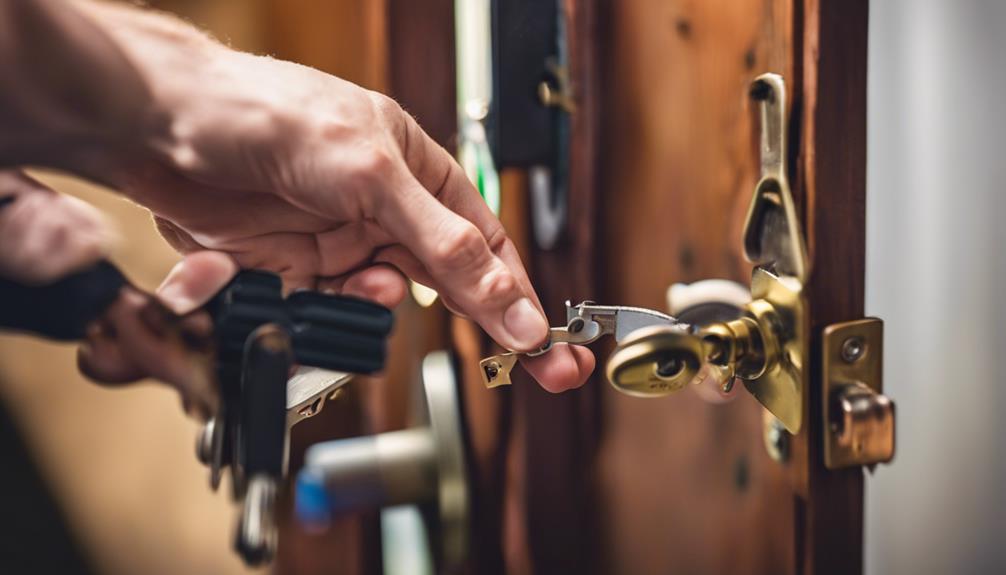Re-keying your locks is an efficient way to boost your home security without the high cost of replacing them entirely. It adjusts the internal mechanism, rendering old keys useless, which is especially essential if you've lost your keys or just moved into a new home. This process allows you to manage multiple locks with a single key, simplifies access for trusted individuals, and enhances peace of mind. Plus, it's quick and often manageable as a DIY project if you're comfortable with tools. Stick around to uncover more insights on how to effectively re-key your locks and maintain your home's security.
Key Takeaways
- Re-keying enhances home security by changing internal lock mechanisms, making old keys useless without replacing the entire lock.
- It is essential to re-key after losing keys, moving into a new home, or for rental properties to ensure safety.
- Re-keying is a cost-effective solution compared to full lock replacement, providing significant savings while maintaining security.
- The process involves replacing internal pins within the lock cylinder, allowing a new key to operate the lock effectively.
- Regular maintenance, including inspections and lubricant application, helps ensure the longevity and smooth operation of re-keyed locks.
Understanding Lock Re-keying
Lock re-keying is a straightforward process that enhances your home's security without the need for replacing the entire lock. This process involves adjusting the lock's internal mechanism, which can be a great way to upgrade your security system without incurring the costs associated with new locks.
You might wonder why rekey home locks instead of opting for new ones. The answer lies in the efficiency and cost-effectiveness of residential lock rekeying. By simply changing the internal pins of your existing lock, you render old keys useless while keeping the lock intact. This not only saves you money but also reduces waste, promoting a more sustainable approach to home security.
Understanding the rekeying process can help you feel more confident in making this decision.
Home security rekeying is particularly beneficial when you've moved into a new house or if you've lost a key. It gives you peace of mind, knowing that only you and those you trust can access your home.
Additionally, this process allows you to maintain a consistent keying system across multiple locks, simplifying your access.
Ultimately, understanding lock re-keying empowers you to make informed decisions about your home's safety. By choosing to rekey your locks, you're taking a proactive step in safeguarding your living space and ensuring the well-being of your family.
When to Consider Re-keying
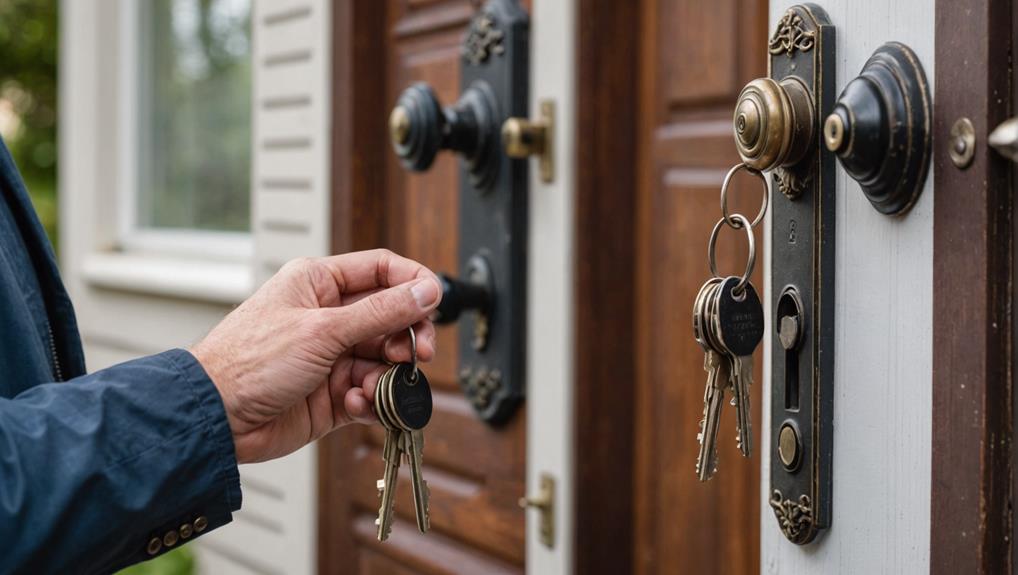
If you've lost your keys or had them stolen, re-keying your locks is a smart move to enhance your security.
In situations like these, Re-Keying: A Solution for Lockout Emergencies can be particularly helpful, especially for rental and commercial properties.
Similarly, when you buy a new home, it's essential to re-key to guarantee no previous owners or their contacts have access.
Taking these steps can give you peace of mind in your living space.
Lost or Stolen Keys
Losing your keys or having them stolen can create a whirlwind of anxiety and uncertainty about your home's security. In such situations, it's vital to act quickly to protect your space and your loved ones.
If you've misplaced your keys or suspect they may be in the wrong hands, consider home lock rekeying as a proactive solution.
Rekeying locks for homeowners is an efficient way to guarantee that old keys no longer work. This process involves changing the internal mechanisms of your locks, rendering any lost or stolen keys useless. You won't have to replace the entire lock, which saves both time and money.
It's important to address the issue promptly. The longer you wait, the greater the risk becomes. If you're feeling uneasy about your home's safety, don't hesitate to reach out to a professional locksmith.
They can guide you through the rekeying process, assuring your home remains secure. By taking these steps, you'll not only alleviate your anxiety but also regain peace of mind, knowing your home is protected from unauthorized access.
New Home Purchase
Buying a new home is an exciting milestone, but it also comes with concerns about security. Before moving in, you should think about re-keying the locks. You don't know who may have keys to your new home, from previous owners to their friends or family. By re-keying, you guarantee that only you and your loved ones have access, which brings peace of mind.
Re-keying is a cost-effective way to enhance your home's security. It's usually quicker than changing the entire lock system, and you can often keep the same hardware.
Plus, you can choose to upgrade to smart locks or deadbolts during the process, providing even greater security.
When you settle into your new community, you want to feel safe in your environment. Re-keying your locks is a simple yet effective step you can take to protect your home and your family.
It's not just about securing your property; it's about nurturing a sense of safety that allows you to focus on making lasting memories in your new abode.
Benefits of Re-keying
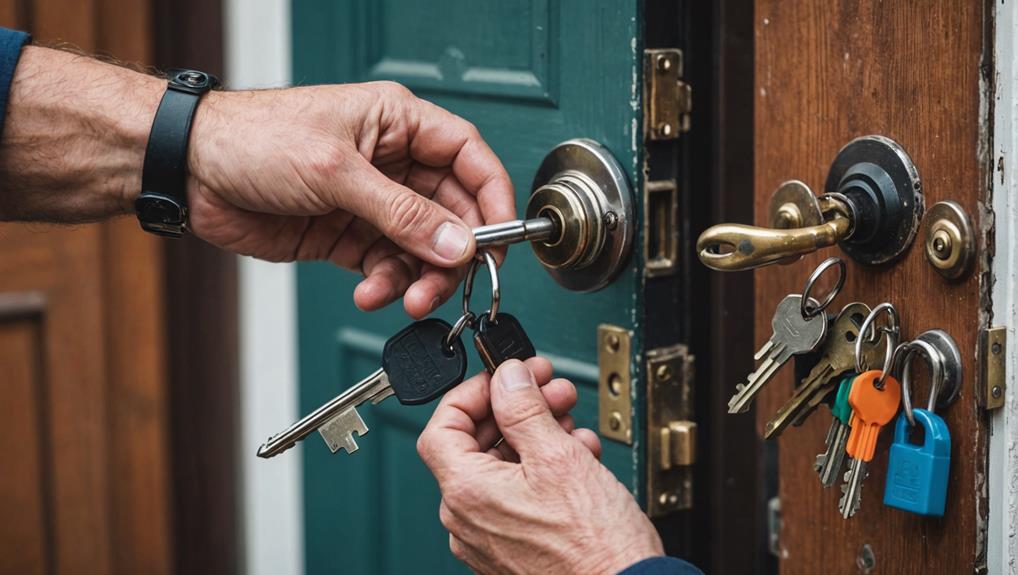
When you re-key your locks, you boost your home's security without breaking the bank.
This process not only protects you from unauthorized access, but it also offers the advantages of re-keying locks as a practical alternative to replacing entire lock systems.
It's a cost-effective solution that gives you peace of mind while offering the convenience of managing multiple keys with ease.
Plus, it gives you the flexibility to adapt to your changing needs over time.
Enhanced Security Measures
Re-keying your residential locks offers a straightforward yet effective way to bolster your home's security. By changing the internal mechanism of your locks, you guarantee that old keys no longer work, reducing the risk of unauthorized entry. This is especially important if you've recently moved into a new home or lost a key. You want to protect not just your belongings, but also your loved ones.
Another benefit is that re-keying can help you manage access for those who may need temporary entry, such as house sitters or repair personnel. You can easily grant or revoke access without the hassle of replacing entire locks. This flexibility allows you to maintain control over who can enter your home.
Moreover, re-keying is a proactive measure that demonstrates your commitment to security. It sends a message to potential intruders that you take safety seriously.
When you prioritize the well-being of your family and community, you're also fostering peace of mind. By investing in re-keying, you're taking a significant step in creating a secure environment that not only protects your home but also serves as a welcoming haven for those you care about.
Cost-Effective Solution
One of the most appealing aspects of re-keying your locks is how budget-friendly it's compared to replacing them entirely.
If you're looking to enhance your home's security without breaking the bank, re-keying offers an excellent solution. Instead of investing in new hardware, you can simply change the internal mechanism of your existing locks, which often costs considerably less.
This cost-effective approach allows you to prioritize your budget while ensuring your home remains secure.
It's especially beneficial if you've recently moved in or lost a key, as it gives you peace of mind knowing that only you have access to your home.
Plus, it's a quick process that most locksmiths can handle in no time, allowing you to focus on other important aspects of homeownership.
Convenience and Flexibility
Convenience is a major advantage of re-keying your locks, allowing you to quickly enhance security without the hassle of replacing hardware. When you choose to re-key, you can maintain your existing locks and simply change the internal pins, making it a straightforward process.
This means less disruption to your routine and no need for extensive locksmith services or renovations.
Moreover, re-keying gives you the flexibility to manage access to your home effortlessly. If you've recently moved in or had a change in your household, re-keying guarantees that only those you trust have keys.
You can re-key multiple locks to work with a single key, simplifying access for family members or trusted friends.
This is especially beneficial for families with children or caregivers, as it allows you to control who's access to your home. If you ever need to grant temporary access, you can easily re-key again, securing your peace of mind.
How Re-keying Works
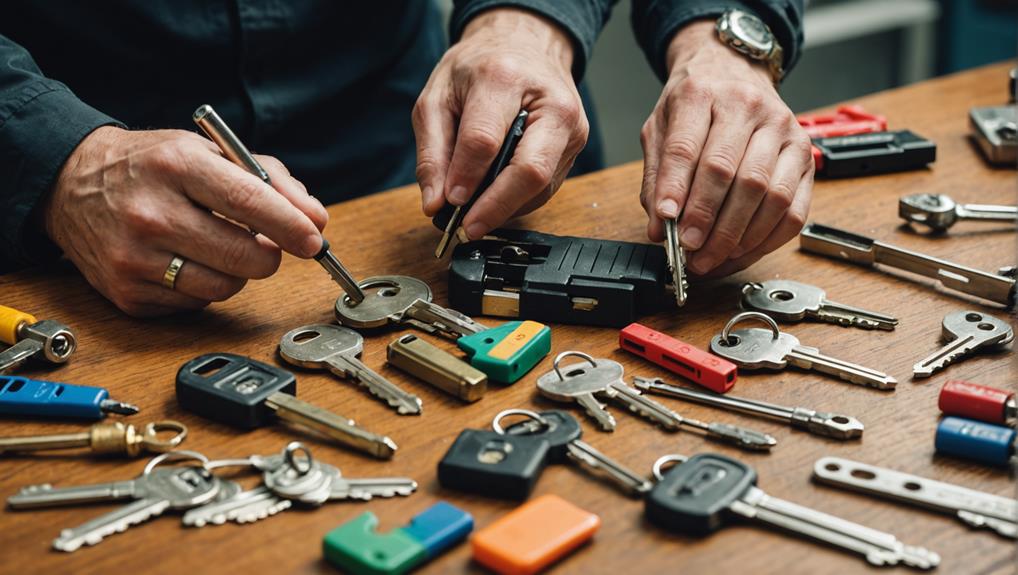
Understanding how re-keying works can simplify your home security upgrades. Re-keying involves changing the internal configuration of your lock so that it operates with a new key. When you opt for this service, the locksmith removes the lock from the door and disassembles it to access the cylinder. This process is often straightforward, but having a basic knowledge of common challenges can be beneficial.
Inside the cylinder, you'll find pins of different lengths. Each pin corresponds to a specific key cut. To re-key the lock, the locksmith replaces these pins with new ones that match the shape of your new key. This process guarantees that any old keys will no longer work, enhancing your home's security.
Re-keying is often quicker and more cost-effective than replacing an entire lock. It allows you to maintain your existing hardware while still achieving peace of mind.
Whether you're a homeowner looking to improve security or helping a friend in need, understanding this process empowers you to make informed decisions.
Tools Needed for Re-keying
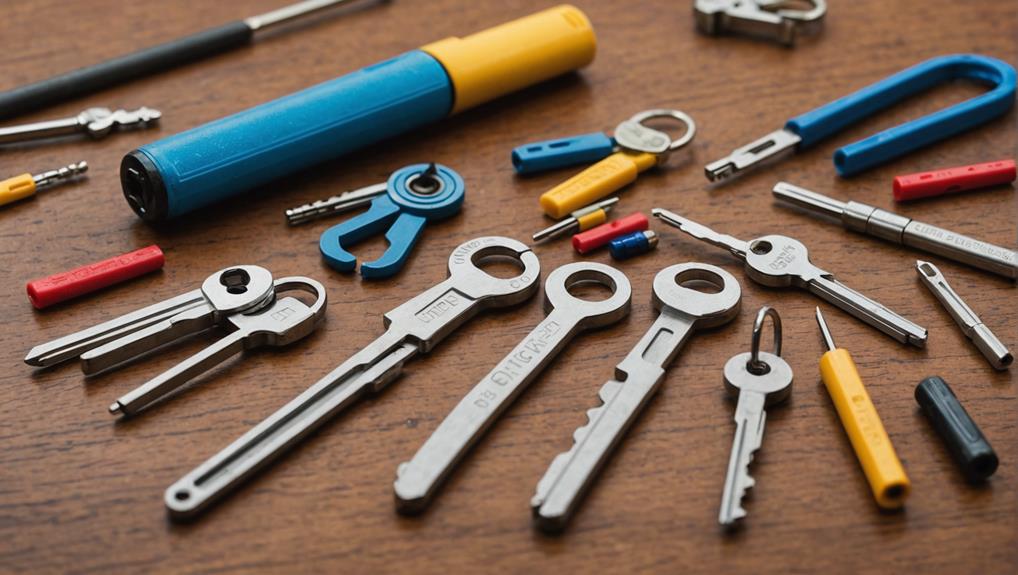
To successfully re-key a lock, you'll need a few specific tools that make the process efficient and effective. First, grab a re-keying kit designed for your lock type. These kits usually include new pins and keys tailored for your specific lock brand, guaranteeing compatibility.
It's also beneficial to familiarize yourself with the essential tools for lock re-keying to confirm you have everything needed.
Next, a screwdriver set is vital. You'll use these to remove the lock from the door and access its inner workings. A pair of pliers can also come in handy to manipulate small parts while you work.
Make sure you have a small flashlight, too. This can be invaluable for illuminating the lock's interior, so you don't miss any components.
Lastly, keep a clean cloth or workspace ready. As you handle the lock's parts, it's important to maintain organization and cleanliness to avoid losing anything.
With these tools in hand, you'll be well-prepared to assist others in securing their homes through re-keying.
Steps to Re-key Your Locks
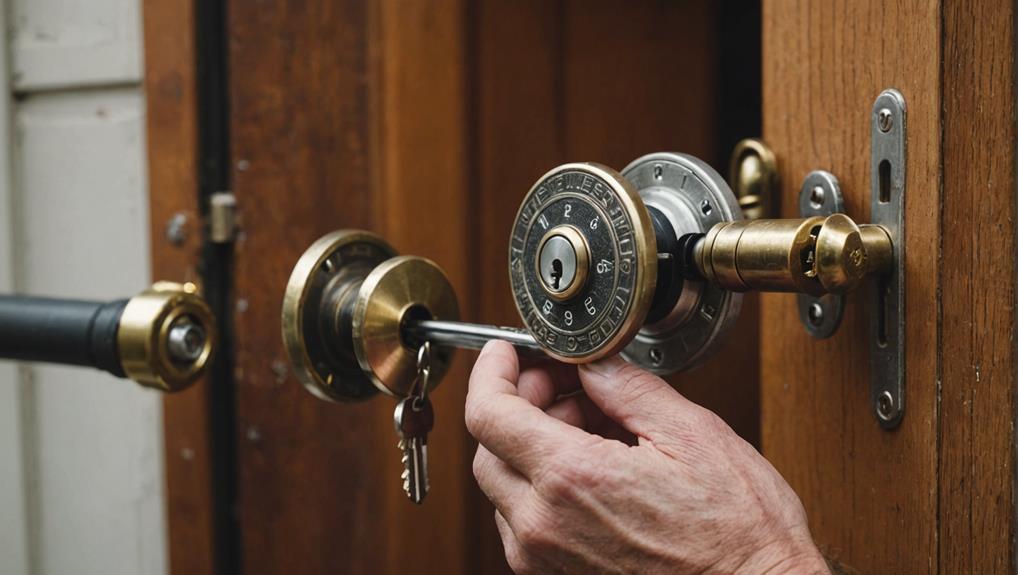
Re-keying your locks is a straightforward process that can enhance your home's security without the need for a full lock replacement.
To get started, gather your tools and materials, including a DIY re-keying kit specific to your lock type.
First, remove the lock from your door by unscrewing the screws on the interior side.
Next, take out the cylinder by pressing the release pin, usually found at the side of the lock.
Once you've removed the cylinder, you'll find the pins inside. Use the re-keying kit to replace the old pins with new ones that correspond to your new key.
Be sure to follow the kit's instructions closely, as this step is essential for ensuring your new key works smoothly.
After you've replaced the pins, reassemble the lock by sliding the cylinder back in place and securing it with the screws.
Finally, test your new key to confirm it operates the lock properly.
Hiring a Professional vs. DIY
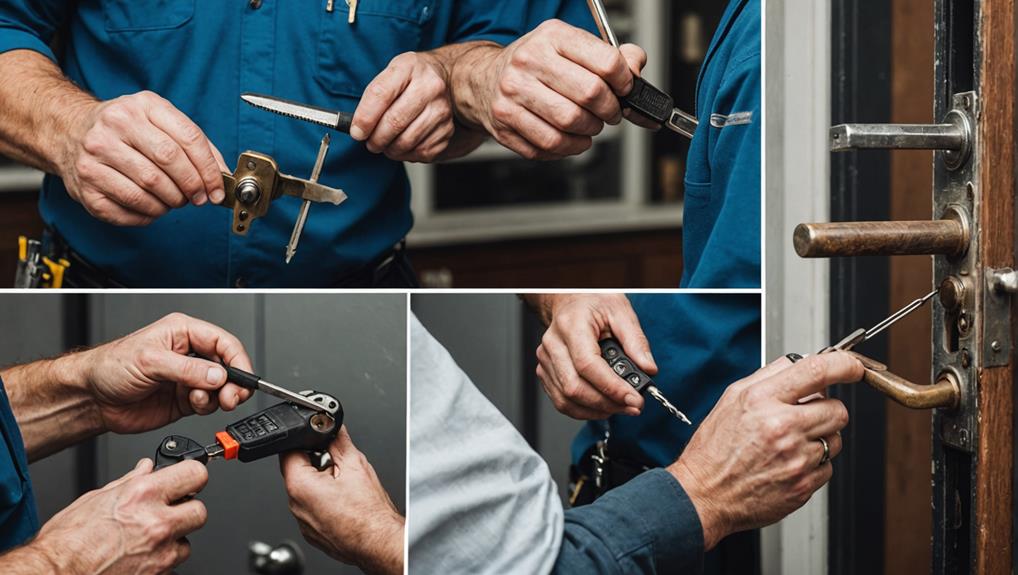
Often, homeowners face the decision of whether to tackle lock re-keying themselves or hire a professional. If you're contemplating the DIY route, it's crucial to evaluate your comfort level with tools and your understanding of lock mechanisms.
Re-keying requires precision, and any mistakes can leave your home vulnerable. Additionally, it's important to examine the detailed cost comparison between DIY and professional re-keying services, as this can greatly impact your decision-making process.
On the other hand, hiring a professional locksmith can offer peace of mind. These experts have the right tools and experience to guarantee the job is done correctly and efficiently.
They can also provide valuable advice on security measures for your home, enhancing your overall safety. When you hire a professional, you're not just paying for their time; you're investing in expertise that can save you from potential issues down the line.
Plus, you'll have the assurance that your locks are functioning smoothly. If you enjoy hands-on projects and feel confident in your skills, a DIY approach might be satisfying.
However, if you value security and convenience, bringing in a professional could be the best choice. Ultimately, it's about what serves you and your home best.
Cost Factors for Re-keying
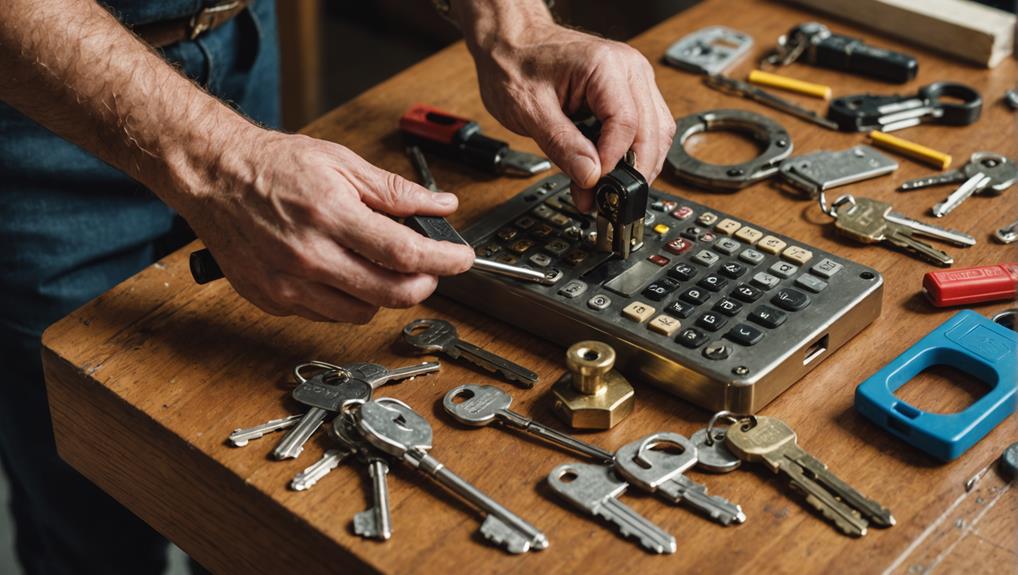
Understanding the cost factors for re-keying locks can greatly influence your decision-making process. When you consider re-keying, the type of locks you have plays a crucial role in the overall cost.
Standard pin tumbler locks are generally cheaper to re-key compared to more complex systems like smart locks or high-security locks, which can considerably increase expenses due to their intricate mechanisms and specialized keys. Additionally, understanding lock re-keying costs can help you budget effectively.
Labor costs also vary depending on whether you hire a professional or decide to tackle it yourself. If you choose a locksmith, their rates may include service fees and travel charges, especially if you live in a remote area.
Additionally, the number of locks you want to re-key affects the total price. If you're re-keying multiple locks, some professionals may offer bulk discounts, which can save you money in the long run.
Lastly, you should factor in the cost of new keys. Some locksmiths provide a set number of keys with their service, while others may charge extra for additional copies.
Maintaining Your New Locks
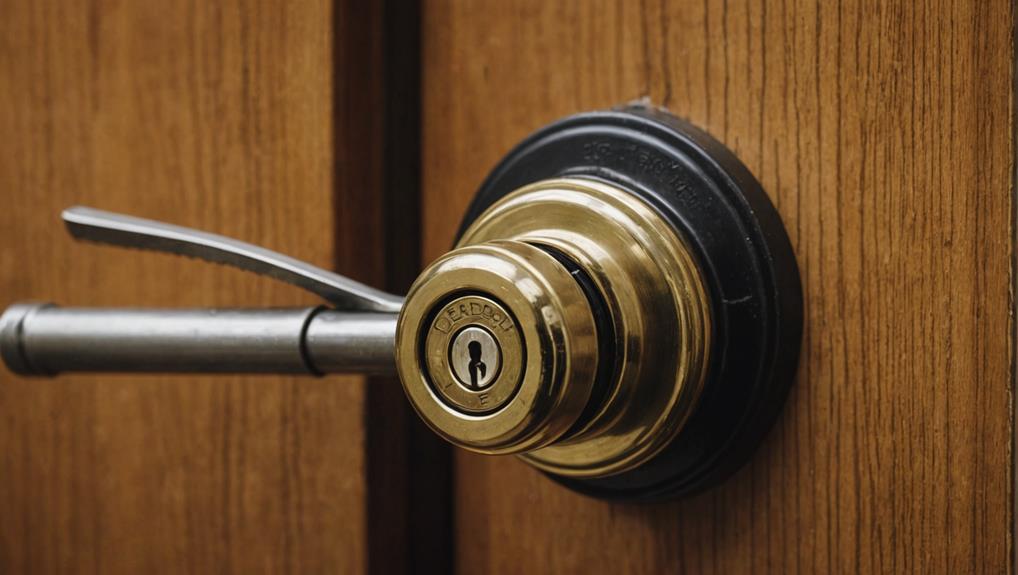
Maintaining your new locks is essential for ensuring their longevity and effectiveness. Regular upkeep not only safeguards your home but also provides peace of mind for you and those you care about.
Start by inspecting the locks periodically. Look for any signs of wear, rust, or damage that might compromise their function. Additionally, consider re-keying your locks periodically, especially after moving into a new home or if you lose a key, as this can greatly enhance your security re-keying padlocks and specialty locks.
To keep your locks operating smoothly, apply a small amount of graphite lubricant or a silicone-based spray every few months. Avoid using oil-based lubricants, as they can attract dirt and debris.
When cleaning, gently wipe down the lock exterior with a soft cloth to remove dust and grime.
It's also important to test your keys regularly. If a key feels stiff or doesn't turn smoothly, consider having it checked or replaced. Encourage your family members to report any issues immediately; prompt attention can prevent bigger problems down the line.
Lastly, if you have kids or tenants, educate them about lock care. By fostering a sense of responsibility, you'll create a safer environment for everyone.
Frequently Asked Questions
Can I Re-Key Locks Without Losing Existing Keys?
Yes, you can re-key locks without losing your existing keys.
When you re-key a lock, you're fundamentally changing the internal pins to match a new key while keeping the old key functional until you decide to replace it.
It's a great way to enhance security without having to buy new locks.
Just make certain to follow the proper re-keying process, or consider hiring a professional locksmith to guarantee it's done correctly.
How Often Should I Consider Re-Keying My Locks?
You should consider re-keying your locks whenever you experience a significant change in your living situation.
If you've lost a key, had a roommate move out, or purchased a new home, it's wise to re-key for added security.
Regularly evaluating your locks every few years can also help maintain safety.
Trust your instincts—if something feels off, don't hesitate to re-key.
It's always better to be safe than sorry when it comes to security.
Is Re-Keying Safe for All Types of Locks?
Re-keying is generally safe for most types of locks, but it's important to take into account the lock's condition and design.
If a lock's internal mechanism is damaged or outdated, re-keying mightn't work effectively.
You'll want to verify the lock can be re-keyed before proceeding.
Always consult a professional locksmith to evaluate your specific situation, so you can make the best decision for your security needs.
Will Re-Keying Affect My Home Insurance Policy?
Re-keying your locks generally won't affect your home insurance policy, but it's smart to check with your insurer first.
Most policies focus on security measures rather than the specifics of lock types.
However, if re-keying improves your home's safety, it might even help your case for lower premiums.
Always keep your insurer in the loop about changes you make to your home's security for peace of mind and proper coverage.
Can I Re-Key Electronic Locks or Smart Locks?
Yes, you can re-key electronic locks or smart locks, but it depends on the model.
Some smart locks allow you to change access codes or reprogram the device easily.
Others may require specific tools or a professional to handle the re-keying process.
Always check the manufacturer's guidelines for instructions.
If you're unsure, reaching out to a locksmith can help guarantee the procedure's done correctly and securely for your peace of mind.
Conclusion
In the domain of home security, re-keying your locks is a prudent step to guarantee peace of mind. By taking this simple yet effective measure, you can discreetly safeguard your sanctuary without the need for a full lock replacement. Whether you choose to embrace the DIY approach or enlist a professional's expertise, the benefits are clear. In doing so, you not only enhance your security but also cultivate a reassuring atmosphere within your cherished abode.

